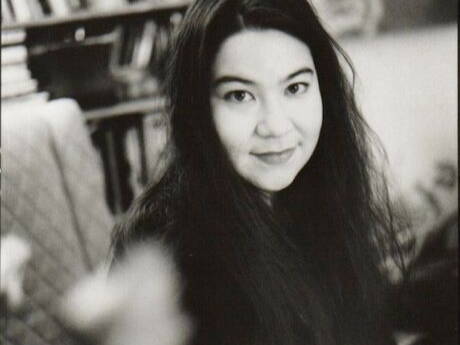New American Poets
New American Poets: Brenda Shaughnessy

I'm Perfect at Feelings
so I have no problem telling you
why you cried over the third lost
metal or the mousetrap. I knew
that orgasms weren't your fault
and that feeling of keeping solid
in yourself but wanting an ecstatic
black hole was just bad beauty.
Certain loves were perfect
in the daytime and had every
right to express carnally behind
the copy machine and there are
no hard feelings for the boozy
sodomy and sorry XX daisy chain,
whenever it felt right for you.
And when the moment of soft
levitation with erasing hands
made you feel dirty, like
the main person to think up love
in the first place, I knew that.
It's okay, you're an innocent
with the brilliance of an animal
stuffing yourself sick on a kill.
Don't, don't feel like the runt alien
on my ship: I get you. I know
the dimensions of your wishing
and losing and don't think you
a glutton with petty beefs. But
even I, who knows your triggers,
your emblematic sacs of sad fury,
I understand why the farthest fat trees
sliver down with your disappointment
and why the big sense of the world,
wrong before you, shrugs but
somewhere grasps your spinning,
stunning, alone. But you have me.
"I'm Perfect at Feelings" by Brenda Shaughnessey. All Rights Reserved. Reprinted with the permission of the author.
Poets are always asked, "Why do you write?" This question is tiresome only because we ask it of ourselves so often, usually at times of despair or block, and because the answers never feel satisfactory and true for long. One must continually revise one's own reasons for writing, avoid thinking about it altogether, or have one two-ton granite slab of a dogged methodology.
Do we write to "give back," to be a part of the literature we love and that most likely saved us? The askers really believe, secretly or loudly, however, that we write for love. The idea is clichéd for a reason: it's a serviceable passive-aggressive answer to the question, with added charm, implying an endearing, artsy blend of pathos, loneliness and honesty. Writing for love is a fine place to start, but a strange place to end, if one accepts this cliché at its basest implication. In practice, it can retard the movement of a writer's mind, allowing a poet to languish in the same imaginary dirty sheets for months on end. This can be wonderful, intense, but does it yield wonderfully intense poems? Sometimes not, especially if the writer is unable to see through her own theater curtains.
I've certainly blinded myself this way, and love is the only thing that has ever motivated me to write at all. Writing love poems cannot simply be what it seems: begging that the "you" understand the infinite mysteries of "me" and forgiving them for still loving "me." This headlock, this dyad, can uncover endless variations of performances, supplication, desire. The trick is for the poet not to actually believe for too long that she is writing to or about a real person. What cracks it open for me lately is expanding my notion of a beloved. From whom can one ask total, endless, unconditional love?
If, in a poem, I am making outrageous and often unreasonable requests for love of a particular kind, that outsized entitlement positing otherworldly capacity and a bottomless pit, who but an imagined lover, a projection, could fulfill it?
This endless, often mercurial desire is looking to be mirrored, and in that, transmogrified by the light produced. My poems are in search of lovers, the other half of themselves. The longing is not for completion but for harmony, symmetry, and an equal and opposite reaction. Longing for the sign that one is not alone in the world. Life, in its everyday forms, looks for a match: the particular sweetness of a macaroon or a certain friend in a certain mood. The "match" or the soulmate of the poem may not be a person, or another poem. It may be a twig or the wake of a tugboat. And the merging, the union, is not important. It's the beauty of the state of longing with its hope and discomfort, the idea that one's words correspond with some other form of love out there yet unfound. This is why poets write, or at least why I do.


